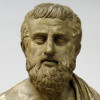“ The thief imagines he does no evil, when he steals from the rich, what he supposes they may easily want, and what possibly they may never even know has been stolen from them. The adulterer imagines he does no evil, when he corrupts the wife of his friend, provided he covers his intrigue from the suspicion of the husband, and does not disturb the peace of the family. ”
Adam Smith, The Theory of Moral Sentiments (1759). copy citation
| Author | Adam Smith |
|---|---|
| Source | The Theory of Moral Sentiments |
| Topic | suspicion evil |
| Date | 1759 |
| Language | English |
| Reference | |
| Note | |
| Weblink | https://en.wikisource.org/wiki/The_Theory_of_Moral_Sentiments |
Context
“The moment he thinks of departing from the most staunch and positive adherence to what those inviolable precepts prescribe to him, he is no longer to be trusted, and no man can say what degree of guilt he may not arrive at. The thief imagines he does no evil, when he steals from the rich, what he supposes they may easily want, and what possibly they may never even know has been stolen from them. The adulterer imagines he does no evil, when he corrupts the wife of his friend, provided he covers his intrigue from the suspicion of the husband, and does not disturb the peace of the family. When once we begin to give way to such refinements, there is no enormity so gross of which we may not be capable.
The rules of justice may be compared to the rules of grammar; the rules of the other virtues, to the rules which critics lay down for the attainment of what is sublime and elegant in composition.”
source


